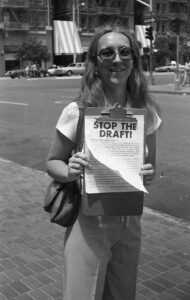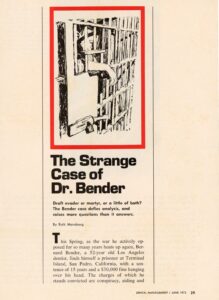Committee Opposed to Militarism and the Draft Records
Formed in 1979 in the wake of a congressional vote on reinstating the draft, the Committee Opposed to Militarism and the Draft (COMD) was formed by San Diego-based anti-war activists Bill Roe, Hoppy Chandler, Norm Lewis, Fritz Sands, and Rick Jahnkow. Originally a chapter of the national Committee Against Registration and the Draft (CARD), the group formed as a grassroots effort to defeat draft registration legislation, organize opposition to future drafts, and expand the network of anti-draft/militarism work. Early successes included organizing around legislation proposed by President Jimmy Carter to begin draft registration in response to the Soviet invasion of Afghanistan, leafleting high schools over military recruiting, and supporting draft resisters, including Ben Sasway, a college student from North San Diego County who was among the first indicted for violating the Selective Service Act since the Vietnam War.
In addition to fighting prosecutions of draft resisters, S.D. CARD focused its efforts on counter recruitment campaigns in and around local high schools. In 1983-84, S.D. CARD began to broaden its focus beyond draft work to include the anti-nuclear movement, U.S. military involvement in Central America and the Caribbean, immigration, the militarism of the U.S./Mexico border, discrimination in the military, military impacts on the environment, and other militarism-related issues to become a more inter-sectional organization. This prompted the group to change their name to the Committee Opposed to Militarism and the Draft and to joining other coalitions such as the San Diego Military Toxics Campaign, a coalition of groups educating the public on nuclear-powered aircraft carriers docked in San Diego, and the National Network Opposing the Militarization of Youth (NNOMY). Today the group continues to fight state, local, and federal legislation related to the draft, including legislation in the 2020s that would expand draft registration to include women. COMD has also called for Congress to eliminate the Selective Service System and discontinue draft registration entirely.
This small collection consists of a run of COMD’s newsletter, Draft NOtices from 1979 to 2021 as well as clippings, photographs, circular letters, fliers, legal documents, press releases, correspondence, minutes, and pamphlets primarily from the 1979-1987 period. The material documents COMD’s campaigns, including the Ben Sasway campaign, as well as administrative material illustrating the inner workings of the group. There are also many newspaper clippings that document the national debate around the draft as well as COMD’s activities during this time.



